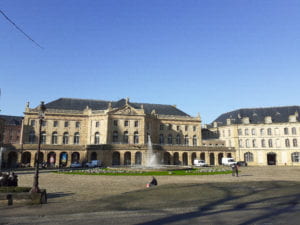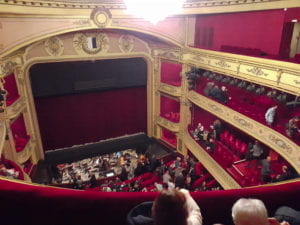Monday, February 10, 2020 | Written by Blanca
Fabulous Parisian fêtes. The infamously dire consumption. Dramatic displays of love, affection, and despair. Giuseppe Verdi’s La Traviata is the most frequently performed of all operas, for a good reason, and last Tuesday night, I got to experience La Traviata in all its glory at the Opéra-Théâtre de Metz Métropole.
A little over a week earlier, on a relatively mundane and unsuspecting Monday morning, I received an email regarding student tickets for an upcoming production of La Traviata at the Metz Opera, causing me to gasp in an otherwise silent classroom. And for five euros? I nearly jumped out of my seat. The score to La Traviata is among my favorites of all time (I highly recommend adding the 1977 La Travita album , as performed by Plácido Domingo, Ileana Cotrubaș, Sherrill Milnes, and the Bavarian State Orchestra under the conducting of Carlos Kleiber to your Spotify playlists with this link, as I have), so as soon as class concluded, I rushed down to the GTL academic office to purchase my ticket.
As the day of the opera rolled around, I was slightly miffed by the fact that I had two exams the next day for which I needed to study that night, but no matter! I came to Europe with the intention of experiencing European culture as fully as I could, and I couldn’t think of a better way to do so than by seeing my favorite opera in France’s oldest opera house. Studying could wait until after Verdi’s compositions filled my ears.

In addition to being the oldest working opera house in France, the Opéra-Théâtre de Metz Métropole, or the Metz Opera, is also among the oldest in Europe. Located on the Petit-Saulcy island in downtown Metz, the Neoclassical opera house, lit up in the chilly night, was literally the star of its own show. Its cobbled drive welcomed us and the rest of the night’s patrons inside, where we were ushered across red-carpeted floors and up a winding wooden staircase to the third-floor balcony. From there, we had a perfect vantage point for viewing the onstage escapades. The set was nothing short of sublime: a semi-opaque screen backdrop provided a set while simultaneously allowing us to see the silhouettes of lithe dancers, mysterious figures illuminated by glowing lights, behind it; the forced perspective floor made the ballroom scenes seem grander and more vast than the stage on which they were held.
La Traviata, as I later learned, was first performed in 1853 at Venice’s La Fenice opera house (by which, I realized giddily, I had passed several times only a few days earlier on my trip to Venice), but despite being over 150 years old, it hasn’t lost any of its beauty. The plot is one of lavish glitz and glamor, reflecting the prosperous social lives of the bourgeoisie, but it is also an observation of, if not a commentary on, a society which staunchly values morality but is steeped in hypocrisy, in which a woman navigates her diminished role in an environment that is decidedly male-dominated. La Traviata also wouldn’t be an opera without a pinch of lament, so at its conclusion, we saw Violetta, the protagonist, undeservedly meet her tragic end. Set to an Italian libretto, this all goes down entirely in Italian; fortunately, there was a screen above the stage displaying a current translation of what is being sung, but unfortunately, this translation was in French, a language which I can neither speak nor read. For this reason, it’s highly recommended that opera-goers familiarize themselves with the opera beforehand (or, in my case, while in line for the bathroom during the intermission).
I couldn’t sign off on this blog post without mentioning the music, which exceeded my admittedly already-high expectations. The recordings to which I’ve listened were already stellar, but nothing beats the in-person, immersive experience of hearing it all live. Tuuli Takala’s performance as Violetta was superb, her adroit soprano piercing through the performance hall, but I could also honestly wax lyrical (pun not intended) about the rest of the cast. I also have an immense appreciation for chamber orchestras, having played in one myself in high school, so hearing the score I’ve so ardently admired being played by a live orchestra was the highlight of my night. The National Orchestra of Metz couldn’t be more deserving of applause.

After a good couple of minutes, the clapping eventually died down and the performance hall’s massive chandelier came back on. As the audience began filing out of their velvet-upholstered seats into the equally sumptuous, palm frond-littered lobby, my opera buddy, Mai, and I glanced at each other. Proclaiming, “that was so good,” her words voiced my very thoughts. La Traviata at the Metz Opera made for a truly magnificent night.
